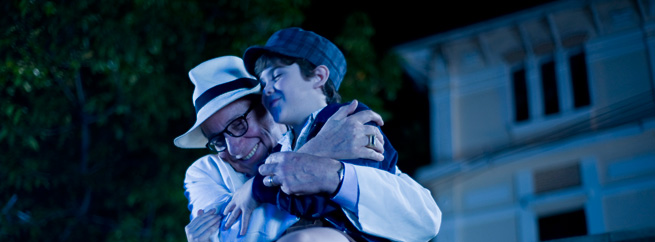
The Supreme Happiness / A Suprema Felicidade
02 September, 2011Everything about The Supreme Happiness is “looking back in time”. First of all the film starts in post-war, late 40s, Rio de Janeiro, Brazil. Second of all, it is film-maker Arnaldo Jabor’s big come-back after his last movie Eu Sei Que Vou Te Amar was produced 25 years ago. Since then Arnaldo Jabor has become a prominent figure as a political commentator for Brazilian TV Globo, and a columnist in newspapers and magazines.
The Supreme Happiness is a “good to watch” film but I wouldn’t exaggerate and say it is a “must watch”. It definitely has its ups and downs, it is a bit slow paced and over dramatized in some parts. It is clear to see that most of the movie’s problems are related to the fact that Arnaldo Jabor stayed away from flm-making for almost 25 years. I am not saying he has lost his touch, but the film has some cliche moments and other problems that actually don’t really make you feel… supremely happy.
It all starts in 1945, at the end of the Second World War in a family house in Rio de Janeiro, centering on it’s occupants,, and more precisely the characters Paulo, from 8 to 19 years of age, his parents Sofia and Marcos, and his grandfather Noel.
The film is permeated with many flashbacks and flash-forwards showing the troubled relationship of Paulo’s mum and dad, played by actors Mariana Lima and Dan Stulbach. I have to mention that some of the scenes between the couple were too theatrical and compromised the result of the film. The dialogue and the acting almost made me cringe sometimes, it was so exaggeratedly dramatic.
On the other hand, the relationship between Paulo – played by three different actors in three different stages of his life – and his bohemian musician grandfather, played by the magnificent actor Marco Nanini, guarantee some good moments to The Supreme Happiness.
Apart from Brazil’s much-loved actor Marco Nanini’s participation, other guest – and equally special – appearances can provide the viewer with some incredibly funny moments. Two of these moments happen at Paulo’s traditional catholic boys-only school, when the two priest-teachers played by legendary actors Ary Fontoura and Jorge Loredo (a.k.a Ze Bonitinho) steal the show talking about masturbation to the pre-adolescent boys.
The two above mentioned scenes are the definite highlights of this film. But some other scenes such as those with old-school actress Elke Maravilha, Paulo’s German grandmother, and the ones involving the “popcorn guy” Bene, played by the excellent Joao Miguel, reminded me of the good old Brazilian cinema and the funny chanchadas.
However, director Arnaldo Jabor opted for more drama than comedy and these two scenes were only exceptions in this supremely dramatic film. A film telling Paulo’s story, exploring the complicity with his grandfather Noel, his friendship with his sexually confused best friend Cabecao, his first sexual experiences and the growing love for Marilyn, his troubled relationship with his mum and dad, his mother’s mental deterioration, a sudden rapprochement with his father and Paulo’s sadness watching his grandfather’s inevitable aging process.
Like I said before it feels like a good and entertaining film sometimes but it is also a bit cliched and annoying in some parts of the film, especially during the (long) musical scenes. Although the public and the critics expected a lot more from this comeback, overall it must be said that it’s good to have Arnaldo Jabor back in the film-making industry, even though the film didn’t reach all of those expectations.
The Supreme Happiness is showing as part of the 3rd Brazilian Film Festival of London. Find out more about the festival here.
Follow Sounds and Colours: Facebook / Twitter / Instagram / Mixcloud / Soundcloud / Bandcamp
Subscribe to the Sounds and Colours Newsletter for regular updates, news and competitions bringing the best of Latin American culture direct to your Inbox.

